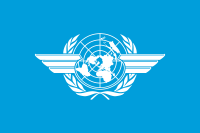Indonesian air industry signs safety deal ahead of EU ban review
Friday, November 16, 2007
45 of Indonesia's 51 air carriers as well as some airport management companies signed a safety deal with the Indonesian government yesterday. The deal will be delivered to the European Commission ahead of a November 19 meeting in Brussels to review the placement of all 51 of Indonesia's airlines on the list of air carriers banned in the EU in June after a string of aviation accidents earlier in the year. Indonesia is already planning to give a presentation on air safety improvements at the meeting.

Under the deal, the airlines have promised to increase supervision of security and safety issues, while the government pledged to increase numbers and abilities of regulation staff. The deal comes a week after EU inspectors suggested that the airlines would benefit from increased safety standards and larger numbers of more highly trained management staff. Ultimately, the deal is intended to bring Indonesia fully up to the standards set down by the International Civil Aviation Organisation (ICAO).
This is a part of a serious effort by the operators and regulators to improve our aviation safety and meet international standards," Transport Minister Djusman Syafii Djamal told Radio Elshinta of Jakarta after the ceremonial signing of the document, adding hopes that the deal would cause the removal of the EU ban.
The deal was arranged by the National Team for Transportation Safety and Security, which was set up to investigate Indonesia's failing transportation infrastructure, particularly the aviation sector.
The six-man group was chaired by Marshal Chappy Hakim, a retired Air Force chief of staff. He told reporters that he felt "We need to work hard to prove we can meet international standards, and that starts with this declaration,"
| We need to work hard to prove we can meet international standards | ||
—Marshal Chappy Hakim | ||
The ban was orriginally placed after three accidents involving Indonesian airliners - the New Year's Day crash of Adam Air Flight 574, which killed 102 people, the subsequent accident involving Adam Air Flight 172, which cracked in half on a hard landing but held together, preventing serious injury, and the March crash of state-run Garuda Indonesia Flight 200, which claimed 23 lives. All the accidents involved aging Boeing 737 aircraft.
Indonesia has also since been the subject of regulatory action by the United States Federal Aviation Administration, who warned US citizens wishing to travel to use alternatives to Indonesian air carriers.
Despite originally threatening a retaliatory ban on European airlines in Indonesian airspace, Indonesia quickly admitted to a poor safety record. Indonesia has since been taking steps recently to improve it's air safety, having already started ranking airlines on safety and signing a deal with the ICAO to set up an independent regulatory body and improve Air Traffic Control operations. Earlier this year, Indonesia shut down several airlines that it viewed as not meeting safety standards. A team from the European Aviation Security Agency has inspected Indonesian airports and interviewed the managers of Garuda Indonesia, Mandala Airlines and Air Fast to gauge how far safety has improved.
The ICAO will evaluate Indonesia's progress in late 2008.
Related news
Sources
- "Indonesian airlines sign safety agreement" — Sydney Morning Herarld, November 16, 2007
- "Indonesia: Authorities vow to improve airline safety and security" — Adnkronos International Indonesia, November 16, 2007
- "EU suggests Indonesian airliners boost supervision on safety" — Xinhua, November 14, 2007

